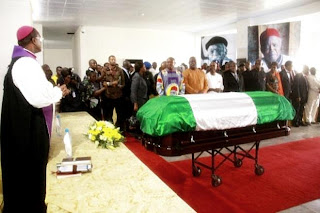Aviation Nigeria
by Tahir Sherriff
The remains of literary icon Prof. Chinua Achebe passed through the Nnamdi Azikiwe International Airport Abuja earlier today to his hometown of Enugu in what is to be a series of rites which will climax with his interment on Thursday, in his hometown, Ogidi, Anambra state.
Chinua Achebe's body arrived Enugu at 12.35pm Tuesday, via a chattered Overland jet which took of from the Nnamdi Azikiwe International Airport Abuja.
The body was received by close family members including his wife, Christie Achebe and other close family members.
His body was afterwards driven to the University of Nigeria, Enugu Campus where it is currently on display for tributes by the academic community.
The Nigerian author and towering man of letters whose internationally acclaimed fiction helped to revive African literature and to rewrite the story of a continent that had long been told by Western voices, died in March in a Boston hospital. He was 82 years.
His agent in London said he had died after a brief illness. Prof. Achebe had used a wheelchair since a car accident in Nigeria in 1990 left him paralyzed from the waist down.
Chinua Achebe caught the world’s attention with his first novel, “Things Fall Apart.” Published in 1958, when he was 28, the book would become a classic of world literature and required reading for students, selling more than 10 million copies in 45 languages.
The story was inspired by the history of his own family, part of the Ibo nation of southeastern Nigeria, a people victimized by the racism of British colonial administrators.
'Things Fall Apart' gave expression to Mr. Achebe’s first stirrings of anti-colonialism and a desire to use literature as a weapon against Western biases. As if to sharpen it with irony, he borrowed from the Western canon itself in using as its title a line from Yeats’s apocalyptic poem 'The Second Coming'
“In the end, I began to understand,” Mr. Achebe later wrote. “There is such a thing as absolute power over narrative. Those who secure this privilege for themselves can arrange stories about others pretty much where, and as, they like.”
Though Prof. Achebe spent his later decades teaching at American universities, most recently at Brown, his writings — novels, stories, poems, essays and memoirs — were almost invariably rooted in the countryside and cities of his native Nigeria. His most memorable fictional characters were buffeted and bewildered by the competing pulls of traditional African culture and invasive Western values.








0 comments:
Post a Comment